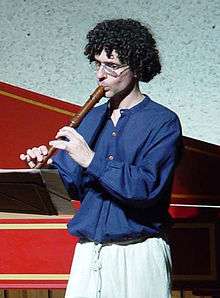Carlos Serrano
Carlos Serrano (born August 29, 1963 in Bogotá, Colombia) is a recorder and early woodwinds player. He completed high school studies at Colegio San Carlos in Bogotá. After studying recorder at Oberlin Conservatory in Ohio and Mannes College of Music in New York with Philip Levin, and with Pedro Memelsdorff in Italy, he graduated from the Early Music Institute at Indiana University as pupil of Eva Legene and Michael McCraw. In 1988 he founded the early music ensemble Musica Ficta (Colombia), with which he has specialized in the performance of Latin-American and Spanish renaissance and baroque music. With this ensemble he has performed in nearly 30 countries in Europe, the Americas, the Far and Middle East. He has recorded for the labels Jade (France), Arion (France), Centaur (USA) and Arts Music (Germany). He taught music at Pontificia Universidad Javeriana in Bogotá.[1]
Carlos Serrano | |
|---|---|
 | |
| Background information | |
| Birth name | Carlos Serrano |
| Born | 1963 Bogotá, D.C., Colombia |
| Genres | Baroque music, Renaissance music |
| Instruments | Recorder |
| Labels | Jade, Centaur, Arts Music, Arion |
| Website | http://www.musicafictaweb.com/ |
Discography
- 1996, p. 2001 – "Romances & Villancicos from Spain and the New World". Éditions Jade No. 198-142-2 (France).
- 1999, p. 2000 – "De Antequera sale un moro" – Music of the Christian, Moorish and Jewish Spain c. 1492. Éditions Jade No. 74321-79256-2 (France).
- 2003, p. 2006 – "Sepan todos que muero" – Music of Peasants and Courtiers in the Viceroyalty of Peru, 17th–18th c.. Centaur Records CRC 2797 (USA).
- 2005, p. 2006 – "Esa noche yo bailá" – Feast and Devotion in High Peru of the 17th Century. Arts Music No. 47727-8 (Germany).
- 2007, p. 2008 – "Del mar del alma" – Music and Poetry in Colonial Bogota (17th–18th c.). Arion ARN68789 (France).
- 2010, p. 2011 – "Cuando muere el sol" – Art Songs by Sebastián Durón (1660–1716). Arion ARN68825 (France).
- 2015, p. 2016 – "Dos estrellas le siguen" – 17th Century Xácaras and Dances in Spain and Latin America . Centaur Records CRC 3501 (USA).
References
- WorldCat. CASARES, E., LÓPEZ-CALO, J., & FERNÁNDEZ DE LA CUESTA, I. Diccionario de la música española e hispanoamericana. [Madrid], Sociedad General de Autores y Editores. Vol. 19, p. 951. 2002. OCLC 44775284.
External links
- Música Ficta'w web page: Música Ficta
- Centaur Records
- Arts Music
- Jade Music
- Arion